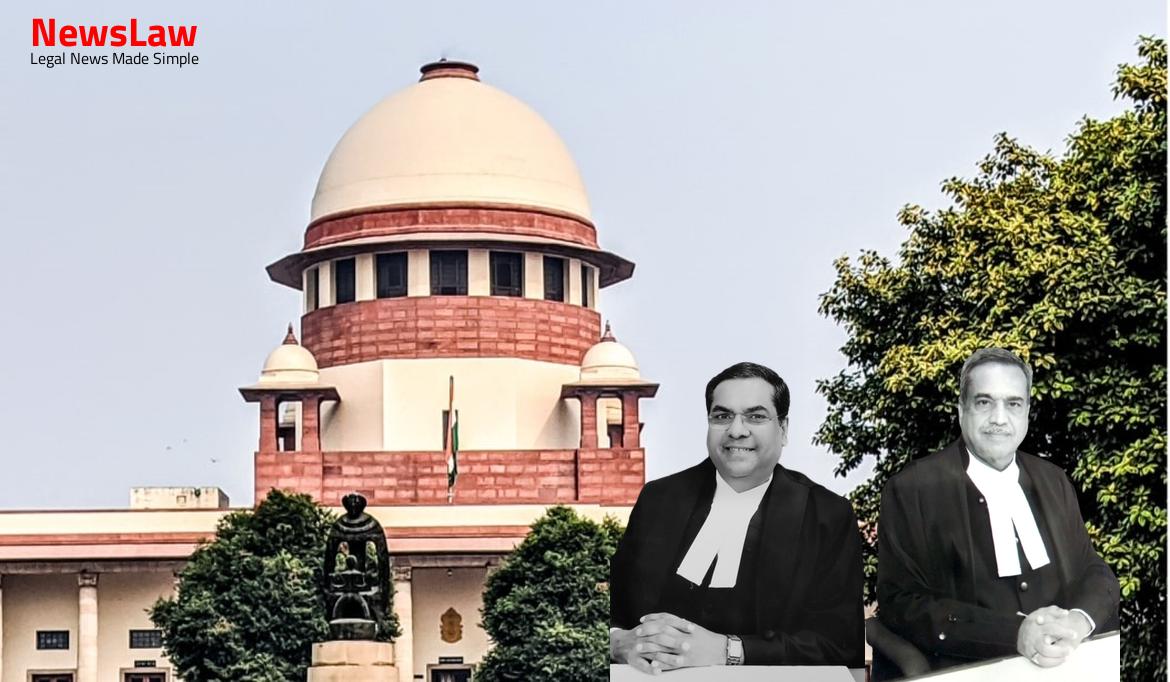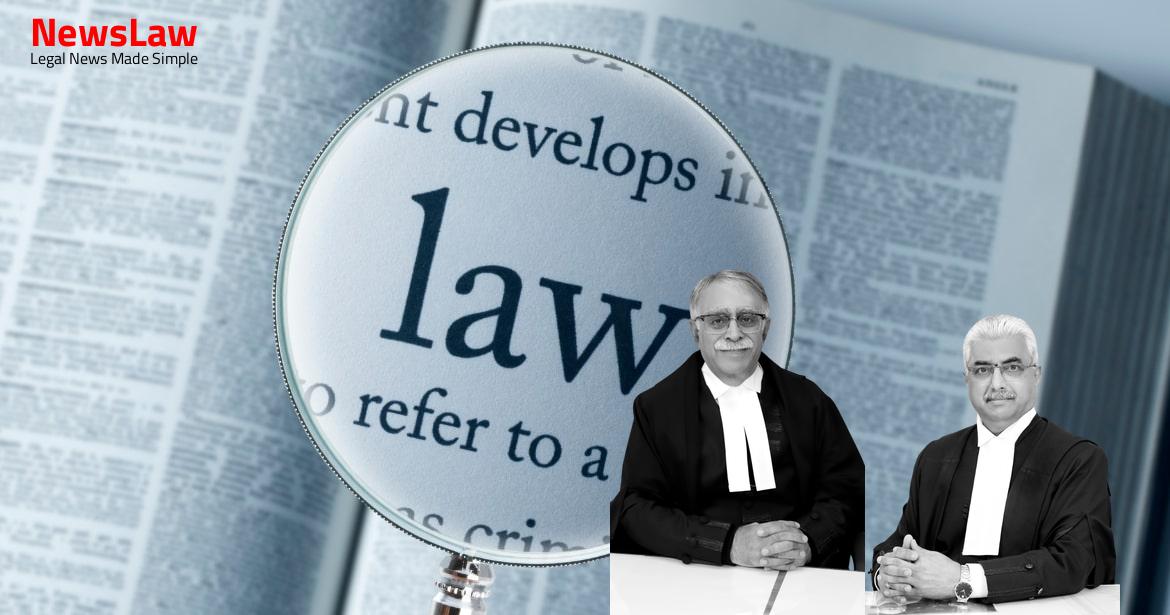Delve into the intricacies of a recent court ruling that analyzed the legality of granting pensionary benefits to employees of autonomous bodies. The court focused on the legal implications of extending such benefits, considering the autonomy and regulations governing these institutions. Stay tuned to understand the implications of this ruling on similar cases and governmental policy decisions.
Facts
- Establishment/Service Rules of the Government of Maharashtra were made applicable to WALMI, except for Pension, Provident Fund, and Gratuity.
- Cabinet approved the proposal to not grant pensionary benefits to employees of Institute receiving Grant-in-aid, Corporations, etc.
- Governing Council of WALMI resolved to send a proposal to the Government for granting pensionary benefits to the employees.
- WALMI employees petitioned High Court for pensionary benefits, citing rejection of previous requests by the State Government.
- High Court directed State Government to extend pensionary benefits to WALMI employees.
- WALMI is an autonomous institution with its own Rules and Regulations, established under the Societies Registration Act, 1860.
- Finance Department reiterated that WALMI employees are not entitled to pensionary benefits and the Contributory Provident Fund does not apply to them.
- Government of Maharashtra introduced Contributory Pension Scheme for its employees, while resolving not to grant pensionary benefits to employees of Grant-in-aid Institutes, Mandals, Corporations, etc.
- WALMI is administered by its Governing Council, with the Governing Council having control over funds and properties of the Society.
- The High Court allowed the writ petitions and quashed the communication refusing to extend pensionary benefits to WALMI employees
- Directed to extend pensionary benefits to WALMI employees with arrears from 06.05.2013
- Observed that the amount available with WALMI is sufficient to meet the financial liability of pensionary benefits
- Noted that WALMI receives 100% grant from the State Government and employees are regulated by Maharashtra Civil Services Rules
- Stated that employees of WALMI are paid from the Consolidated Fund of the State Government
- High Court held that denying pensionary benefits to WALMI employees would be discriminatory and violate Article 14 of the Indian Constitution
Also Read: Ruling on Circumstantial Evidence in Murder Case
Arguments
- Employees of WALMI are governed by its own Service Rules which prohibit pensionary benefits and only apply Gratuity Rules.
- High Court did not consider the financial implications of extending pensionary benefits to WALMI employees.
- NWDA employees claimed parity with Central Government employees for pensionary benefits.
- WALMI is an autonomous body governed by its own rules, not on par with State Government employees.
- Decision to grant or extend pensionary benefits to WALMI employees is a policy decision not to be interfered with under Article 226.
- Court should abstain from issuing directions with financial implications in financial matters.
- WALMI’s Service Rules do not provide for pension/pensionary benefits, only Gratuity Rules of State Govt. employees apply.
- High Court should not have interfered with the policy decision of State Government not to extend Pension Rules to WALMI employees.
- Interference with employer’s policy decisions on service benefits like pension is not permissible under Article 226.
- Courts generally do not interfere with Government policy decisions.
- Reliance placed on the decision in the case of T.M. Sampath Vs. Secretary, Ministry of Water Resources regarding interference with policy decisions.
- State of Maharashtra has appealed against the High Court order directing to extend pensionary benefits to WALMI employees.
- The respondents, original writ petitioners, opposed the appeals stating that the High Courts rightfully directed the State to extend pensionary benefits to the employees of WALMI.
- They argued that WALMI receives 100% grant from the State Government and its employees’ Service Conditions are regulated by Maharashtra Civil Services Rules.
- The employees of WALMI have been consistently given benefits on par with State Government employees in terms of wages, pay scales, and time-bound pay scale fixations.
- The employees are paid out of the Consolidated Fund of the State Government, further strengthening the case for equal treatment.
- The posts allotted to WALMI are part of the Water Resources Department’s establishment in Maharashtra, indicating that WALMI is closely integrated with government operations.
- The High Court rightly found the denial of pensionary benefits to WALMI employees discriminatory and violative of Article 14 of the Constitution of India.
- The High Court also noted that WALMI has adequate funds to support pensionary benefits, reinforcing the lack of justification for the State’s denial of these benefits.
Also Read: Challenging Legal Presumptions in Negotiable Instrument Cases
Analysis
- Donations can be made to individuals or institutions that align with the Society’s objectives
- Remuneration can be provided to individuals or corporations for introducing or assisting the Society
- Support can be given to associations, institutions, societies, funds, and trusts for the benefit of employees or former employees
- Pensions, allowances, and gratuities can be provided to individuals through annual payments or lump sums
- Contributions can be made towards insurance, provident funds, and benefit funds
- The Society can undertake any acts necessary for achieving its objectives
- Judiciary interference in policy decisions with financial implications is unwarranted.
- WALMI does not have financial powers like imposing taxes and depends on State grants.
- The State Government and WALMI have the autonomy to decide on extending pension benefits.
- The decision not to extend pension benefits to employees of aided institutes was a conscious policy choice by the State Government.
- WALMI, being autonomous, has its own rules and regulations governing employee benefits.
- The High Court’s directive to extend pension benefits to WALMI employees was not justified.
- Merely having funds does not necessitate extending pension benefits.
- The principle of parity does not automatically apply to employees of autonomous bodies like WALMI.
- Pension benefits are a recurring expenditure with future liabilities.
- Employees of autonomous bodies cannot claim service benefits on par with Government employees as per the law laid down by the court.
- Discrimination between the State Government and the Autonomous Board/Body cannot be invoked as a matter of right.
- Granting certain benefits may have adverse financial consequences and should be left to the expert body’s decision.
- Employees of WALMI are governed by their own Service Rules and do not have provisions for pensionary benefits.
- Interference with policy decisions with financial implications should be avoided by the Court.
- The High Court’s judgment directing the State to extend pensionary benefits to employees of WALMI is quashed and set aside.
- Employees of WALMI, an autonomous body under the Societies Act, are not entitled to pensionary benefits.
Also Read: Legal Analysis Critique in High Court’s Quashing Order
Decision
- All pending applications have been disposed of
- All appeals have been allowed
- No order regarding costs
Case Title: THE STATE OF MAHARASHTRA Vs. BHAGWAN (2022 INSC 29)
Case Number: C.A. No.-007682-007684 / 2021



